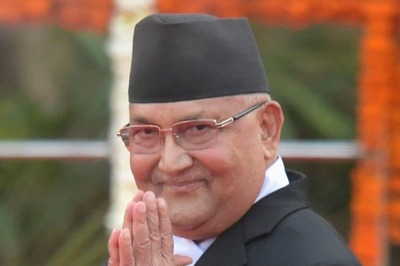
views
Last week, the Ministry of Information and Broadcasting (MIB) sought public comments on the draft Cinematograph (Amendment) Bill 2021 by July 2. The legislature proposes to penalise film piracy with jail term and fine, introduce age-based certification, and empower the central government to order recertification of an already certified film following receipt of complaints.
Centre’s ‘Revisionary Powers’
The draft amendment of the Cinematograph Act, 1952 proposes to give the Centre “revisionary powers” and enable it to “re-examine” films already cleared by the Central Board of Film Certification (CBFC). The draft adds a provision to grant revisionary powers to the government on account of violation of Section 5B (1) (principles for guidance in certifying films) of the Act.
“Since the provisions of Section 5B(1) are derived from Article 19(2) of the Constitution and are non-negotiable, it is also proposed in the Draft Bill to add a proviso to sub-section (1) of section 6 to the effect that on receipt of any references by the Central Government in respect of a film certified for public exhibition, on account of violation of Section 5B(1) of the Act, the Central Government may, if it considers it necessary so to do, direct the Chairman of the Board to re-examine the film,” it said. This means that if the central government now gets the power to reverse the decision of the Board.
Abolishing FCAT
The draft also comes weeks after the Centre decided to do away with the Film Certification Appellate Tribunal (FCAT). a statutory body constituted to hear appeals of filmmakers aggrieved by the cuts suggested by the censor board. The FCAT was helpful for directors seeking a time-bound solution if they were not happy with the censor board’s decision.
Criticism
The move has been heavily criticised by filmmakers who have said the move will lead to restrictions and delays in the release of their films.
Director Vishal Bhardwaj, who has often spoken out against censorship, has called it a “such a sad day for cinema”.
Director Hansal Mehta called it “arbitrary”. “Do the high courts have a lot of time to address film certification grievances? How many film producers will have the means to approach the courts? The FCAT discontinuation feels arbitrary and is definitely restrictive. Why this unfortunate timing? Why take this decision at all?” the “Scam 1992” filmmaker wrote.
Former CBFC chairperson Sharmila Tagore questioned the “rationale” behind the government’s decision, the FCAT was a body of repute which provided filmmakers with respite when they were at loggerheads with the CBFC.
“It gave the filmmaker’s the opportunity to get the certificate if they faced a roadblock from the CBFC. When you’re in films, money apart, time matters. Going to court is not only costly but there’s a lot of delay which the filmmakers can’t absorb,” Tagore told PTI.
Director Vikram Bhatt said he is “frightened” with how the situation might turn out for movie makers without the FCAT. Bhatt had approached the FCAT in 1996 to get his film “Fareb” cleared. He later approached the body again in 2016 for his film “Love Games” which ran into troubles with the CBFC.
“Considering that the courts are so busy and already loaded with cases, will there be a fast-track arrangement for films? In a situation where the censor certificate is coming from the high court, it might deter people from going to the court.
“So they will have no choice but to accept the cuts of the revising committee. I am frightened about how this is going to play out because the FCAT was meant for films. This is going to mean a lot of trouble for us,” Bhatt told PTI.
Piracy Threat
The government said the law will make the process of sanctioning of films for exhibition more effective and curb the “menace of piracy.” The ministry, while adding a provision to penalise film piracy, said release of pirated versions of films on the internet, causes huge losses to the film industry and government exchequer.
“In most cases, illegal duplication in cinema halls is the originating point of piracy. At present, there are no enabling provisions to check film piracy in the Cinematograph Act, 1952 making it necessary to have a provision in the Act to check film piracy,” it said.
The draft bill proposes to insert section 6AA which prohibits unauthorised recording. According to Section 6AA, “Notwithstanding any law for the time being in force, no person shall, without the written authorization of the author, be permitted to use any audiovisual recording device in a place to knowingly make or transmit or attempt to make or transmit or abet the making or transmission of a copy of a film or a part thereof.”
It said that if any person contravenes the provisions of section 6AA, he shall be punishable with imprisonment for a term “which shall not be less than three months but which may extend to three years and with a fine which shall not be less than Rs three lakh but which may extend to 5 percent of the audited gross production cost or with both.”
Age Restrictions
Among the proposed changes, the ministry said the provisions relating to certification of films under “unrestricted public exhibition” category are proposed to be amended and further sub-divide the existing UA category into age-based categories such as U/A 7+, U/A 13+ and U/A 16+.
Bill Drafting
The Standing Committee on Information Technology (2019-20) presented the Ninth Report on Cinematograph (Amendment) Bill, 2019 in Rajya Sabha and Lok Sabha on March 16, 2020. The observations and recommendations made by the committee in the report have been examined and it is proposed to suitably revise the clauses in the Cinematograph (Amendment) Bill, 2019 based on the recommendations.
An expert committee under the chairmanship of Justice (retired) Mukul Mudgal was constituted in 2013 to examine the issues of certification under the Cinematograph Act, 1952.
Another committee of experts was set up under the chairmanship of Shyam Benegal in 2016 to evolve broad guidelines for certification within the ambit of the Cinematograph Act and Rules.
The recommendations made by both the committees have been examined in the ministry and efforts have been made to consider all the relevant issues through internal reviews of the Act in consultation with various stakeholders, the ministry said.
(With PTI inputs)
Read all the Latest News, Breaking News and Coronavirus News here.



















Comments
0 comment